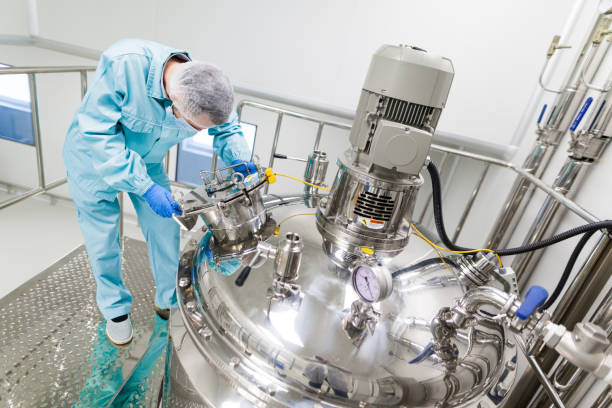
bended scientist in blue lab suit work with big chromed tanks
Introduction
In the world of biotechnology and bioengineering, laboratory bioreactors play a crucial role in the production of various products through fermentation processes. These bioreactors are essentially vessels where biological reactions take place under controlled conditions. The performance of a lab bioreactor can be influenced by several factors that need to be carefully considered by researchers and bioreactor manufacturers.
What is a Bioreactor?
A bioreactor is a device that supports a biologically active environment. Allowing for the cultivation of cells or organisms for a specific purpose. It provides the necessary conditions such as temperature, pH, oxygen levels, and nutrient supply to facilitate the growth and production of various compounds through fermentation.
Factors Influencing Lab Bioreactor Performance
- Type of Bioreactor: The design and type of bioreactor used can significantly impact its performance. Whether it’s a glass bioreactor, stirred-tank fermenter. A pilot-scale fermenter, each type has its unique features that can affect the overall process efficiency.
- Control Systems: The precision of control systems in a lab bioreactor is crucial for maintaining optimal conditions for cell growth and product formation. A well-designed control system can ensure that parameters such as temperature, pH, and agitation speed are accurately maintained throughout the fermentation process.
- Aeration and Mixing: Proper aeration and mixing are essential for providing the necessary oxygen supply to the growing cells and ensuring uniform distribution of nutrients within the bioreactor. Inadequate aeration or mixing can lead to insufficient oxygen levels, uneven nutrient distribution, and poor cell growth.
- Substrate Concentration: The concentration of substrate (such as glucose or other nutrients) in the medium can impact the rate of fermentation and the overall yield of the desired product. Maintaining the right substrate concentration is crucial for achieving optimal bioreactor performance.
- Microorganism Strain: The choice of microorganism strain used in the bioreactor can have a significant impact on the fermentation process and the final product. Different strains may have varying requirements in terms of nutrient utilization, growth conditions, and product formation.
- Sterilization and Cleaning: Proper sterilization and cleaning procedures are essential for preventing contamination in the bioreactor and ensuring the purity of the cultured cells or organisms. Contamination can negatively impact the fermentation process and result in decreased product yield.
Conclusion
In conclusion, several factors influence the performance of a laboratory bioreactor during the fermentation process. By carefully considering and optimizing factors such as bioreactor type, control systems, aeration, substrate concentration, microorganism strain. Sterilization procedures, researchers and bioreactor manufacturers can enhance the efficiency and productivity of bioreactor operations. Understanding these factors. Their impact on bioreactor performance is essential for achieving successful fermentation outcomes in the field of biotechnology and bioengineering.
The key to a successful fermentation process lies in understanding, optimizing. Controlling the various factors that influence lab bioreactor performance. By paying attention to these essential aspects, researchers. Bioreactor manufacturers can achieve higher yields of desired products and advance the field of biotechnology.
In the ever-evolving field of biotechnology, glass bioreactors continue to be indispensable tools for researchers and scientists. With their clear visibility, inert properties, and scalability, glass bioreactors enable advancements in biotech research. Development that would not be possible with other types of bioreactors. Whether in a laboratory setting or a pilot-scale production environment, glass bioreactors play a crucial role in driving innovation. Discovery in the biotechnology industry.








